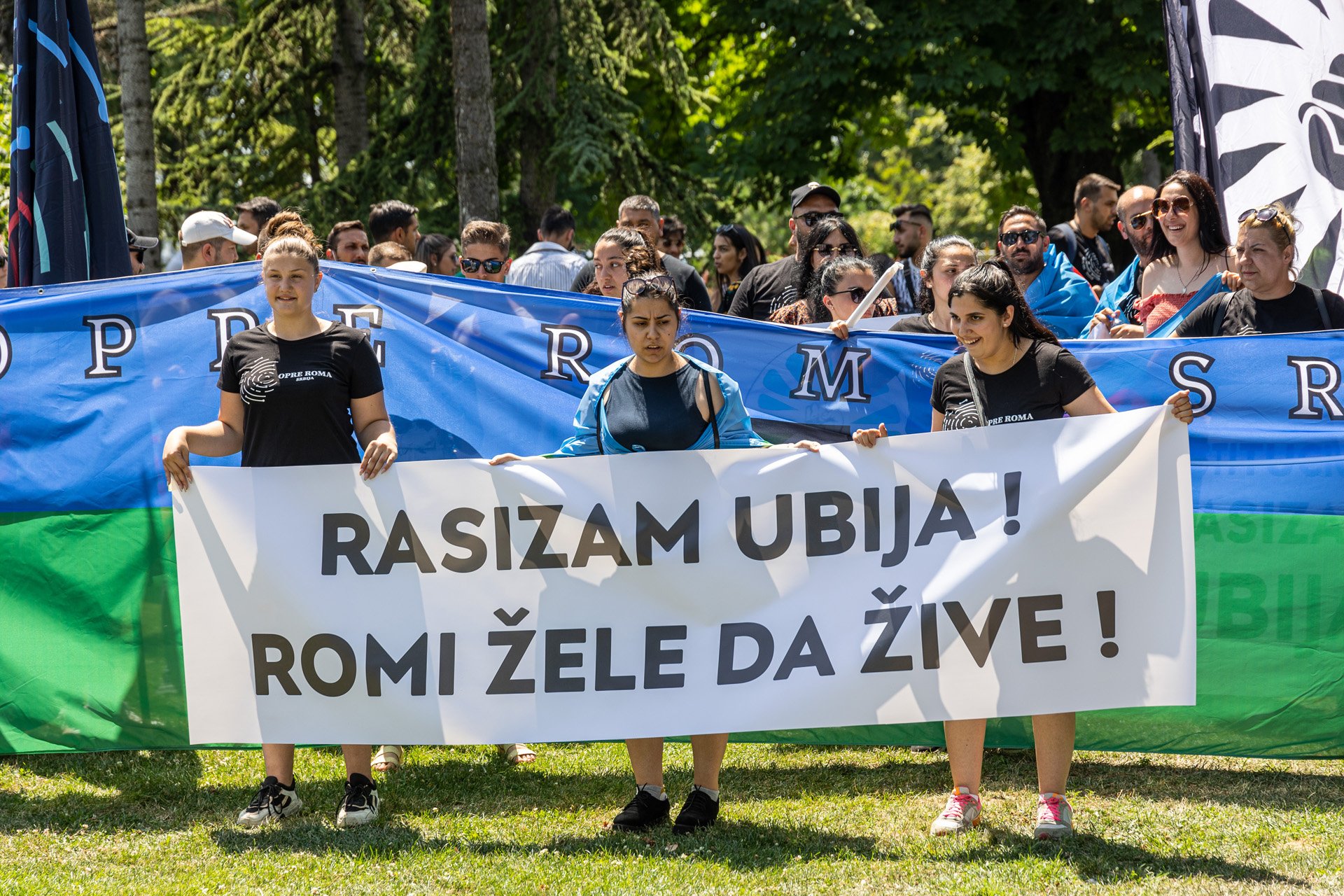When Roma are accused of crimes, alleged wrongdoing is too often twisted into a campaign against an entire community. In Northern Ireland, it has led to far-right violence and a troubling silence from those in power.
In Ballymena, Northern Ireland, two teenagers—identified by Romanian media as Roma—are accused of kidnapping and attempted rape. If the allegations are confirmed, they must be held accountable under the law—no excuses, no hesitation, no ambiguity. The law must be enforced, and the victim must be supported and protected regardless of who the perpetrators are.
But my subject here isn’t guilt or innocence. It’s how society reacts when the alleged perpetrators belong to an ethnic minority that is already deeply stigmatised.
Here’s what happened: according to witnesses, a 13-year-old girl was held captive in a house for several hours and assaulted. Although Ballymena community members initially held a peaceful assembly, violence broke out after information about the case surfaced in the media. The situation escalated within hours.
And it didn’t stop there.
Far-right groups and loyalist paramilitary networks have used this case as a pretext for a campaign of racist intimidation. For six consecutive days, homes and shelters where Roma families lived were attacked. Some houses were burned. Others were ransacked or vandalised. Families fled for their lives. In the words of one Roma NGO from the UK, these were “coordinated pogroms”—not spontaneous reactions, but targeted acts of violence.
Into this climate of fear stepped Nigel Farage. Speaking on GB News, he described the accused as “two Roma people from Romania” and claimed that “Ballymena doesn’t need people like that.” No mention of the presumption of innocence. No concern for the safety of Roma families now under siege. Just a clear message: some lives don’t belong here. When public figures validate such rhetoric, they don’t just express opinions—they legitimise hate.
All the while, the Romanian state—which has a responsibility to protect all its citizens, no matter their creed or ethnicity—has remained silent. No official statement. No institutional response. No gesture of support for Romanians in the community—even though some are currently in danger.
And I can’t help but wonder: if those under threat weren’t identified as Roma, would there be the same indifference? Or is the silence yet another sign that Roma are not truly seen as full citizens of Romania?
These are uncomfortable questions but necessary ones.
Normally the ethnicity of a suspect shouldn’t appear in a news article—especially when it’s irrelevant to understanding the facts. And when certain Romanian outlets choose to include this information—under the pretext of “according to sources”—it’s not quality journalism. It’s a form of complicity. Mentioning ethnic identity without context, without relevance and without critical reflection means validating prejudice, not properly informing the public.
Roma live under a magnifying glass—we’re a population often seen not as citizens but as potential problems. So when a newsroom simply echoes information from a source, spreading it uncritically, it contributes—knowingly or not—to a harmful public narrative.
This isn’t a new practice. There have long been episodes in the European press where a perpetrator’s nationality or ethnicity was used for political gain or to stoke moral panic. In Italy, for example, following crimes committed by Romanians in the 2000s, newspapers like Il Giornale and La Repubblica frequently used headlines like “Romanian Arrested”, fuelling anti-immigration sentiment and even sparking diplomatic tensions with Romania. In Germany, during the post-2015 migration wave, the media frequently discussed “Eastern European criminality” in broad, contextless terms or frequently referred to the refugee status of alleged offenders. The effect is always the same: collective stigmatisation and hate directed at anyone who “resembled” the perpetrator.
And it goes further. In Northern Ireland, local civil society and rights groups have warned for years about the normalisation of racist attitudes and the lack of trust between institutions and Roma immigrants. When violence breaks out, Roma are left without channels to report abuse, without access to protection and without meaningful consultation from the very authorities meant to ensure their safety.
No, I am not defending the perpetrators. If the facts are confirmed, those responsible must be severely punished. But it is possible—and necessary—to demand justice for victims while also demanding that Roma are not treated as scapegoats, as collateral or as people who can be terrorised into silence.
And one more thing: we must no longer accept a world where, when Roma people are the victims, there is no reaction at all.
Because the questions remain: are Roma truly Romanian citizens? Or only when they can be used as a negative example?
Justice must punish offenders, but the state has an obligation to protect all its citizens. Without exception.
Bogdan Burdusel is an activist for Roma rights and democracy. He holds a master’s degree in Public Administration from Central European University in Budapest. As a political communicator and communications advisor, he supports Roma-led organisations advocating for the rights of Roma across Europe.

Bogdan Burdusel
Contributor
The latest

Serbia Must Amend Missing Persons Alert System to Protect Vulnerable Adults

Constitutional Review of the Šutar Law Confirms Serious Rule-of-Law Concerns

Europe’s Growth Depends on Roma Talent
Browse by category
Campaigns
Events
Facts
Press
Voices
For media inquiries:
[email protected]Sign up here so you don’t miss out on campaign updates, upcoming events and other news from the Roma Foundation for Europe and our network.
Sign up for our newsletter